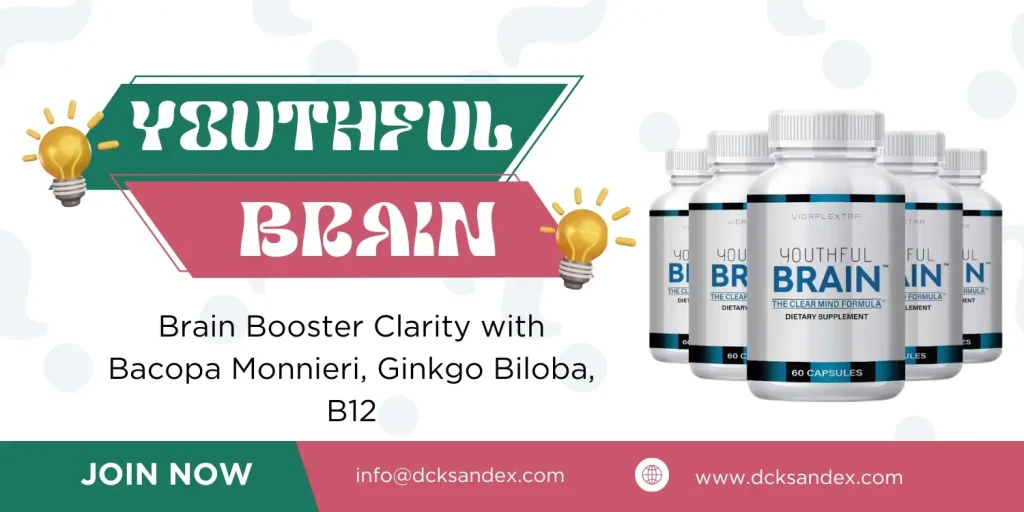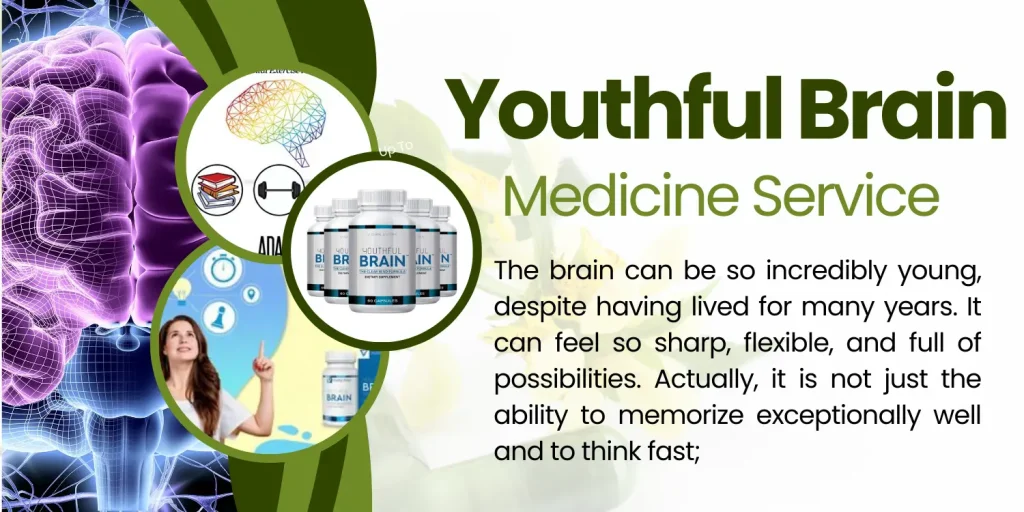Introduction about Youthful Brain?
The brain can be so incredibly young, despite having lived for many years. It can feel so sharp, flexible, and full of possibilities. Actually, it is not just the ability to memorize exceptionally well and to think fast; it includes learning, adaptation, and even flourishing in any environment. While brains change over time, there is still a possibility that a brain could be kept ‘young’. This comes as a combination of healthy practices, but also exercises mentally and lifestyle choices. Exercises regularly, balanced diet full of nutrients that with special effects to the brain, quality sleep can contribute to absolute brain health. Mental exercise, interactive with several people, and mindfulness can aid in keeping that brain agile and strong. To crown it all, staying away from stress and some negative habits such as smoking and excessive drinking is very crucial for retaining good cognitive function. With much more brighter, proactive, and positive approaches towards mind-health, mental clarity alone would be much more beneficial than prevention from the very old age of mental kaguru. Indeed, it is never too much at any time to keep nurturing your brain for vitality that lasts into decades.

What makes the Brain Youthful?
On the other hand, the brain remains youthful, flexible, sharp, and ever-ready to be filled with new experience. Many things contribute to help keep it from dulling with age. One of the first considerations is neuroplasticity: the ability of the brain to make new neural connections. New learning continues as the brain grows older, and this somehow slows down the process of aging. Keeping active and exercising regularly further nourishes the self by increasing flow of blood and oxygen and creating new brain cells. People must consume those foods having antioxidants and omega-3 fatty acids and essential vitamins to nourish their brains so they could be protected against oxidative stress and inflammation that damages cognition. Adequate sleep is likewise important because memory consolidation and self-repair take place at this time in the brain. Giving a few moments of relaxation to the mind for keeping it preoccupied-such as solving puzzles, attaining new skills, or socializing-would keep it active and sharp. Ultimately, controlling the mind and putting on a positive attitude will help cross those negative emotional moments, such that ultimately, one will have a young, removable brain that can flourish at any time of life.
How can you maintain a Youthful Brain?
Length of life, exposure to the open air, physical exercise all join in the long range to give you a brain that is not younger than up to date. Exercise is at least a bit of the deal here because floods of blood exploit the muscles and tissues but they also soak the tissue in the brain while inducing new growth of cells. A diet rich in omega-3 fatty acids, antioxidants, and vitamins will include one that embodies healthy brain nutrients to protect the brain from damage and support memory. Mentally active people will have at least one activity such as reading, solving puzzles, or learning new things that challenge their scientific reasoning and improve neuroplasticity. However, the interpersonal parts will also inform our concern for relationships, as well as reduce stress, contribute to cognitive stimulation, and be healthy for the brain. Quality sleep has a huge number of factors in it, such as recharging the brain, memory consolidation, and repair of self injury. Coping with stress through mindfulness, meditation, or relaxation techniques protects the brain from the worse consequences caused by chronic stress. Avoidance of smoking and heavy drinking are also good habits that contribute to the longevity of the brain.

What foods support a Youthful Brain?
There are different kinds of foods that can greatly assist the health of the brain and keep its youthfulness. Diets consisting of a high amount of antioxidants and healthy fats along with vital vitamins hold great importance in brain protection at the same time enhancing performance and functionality. Fatty fish-rich with omega-3 fatty acids-provides crucial fats for the brain function. They are usually salmon, sardines, and mackerel. Leafy greens are high in vitamins and minerals such as spinach and kale because they contain folate, which is critical for memory and cognitive functions. Berries, especially blueberries, are rich in antioxidants that fight oxidation stress and improve brain plasticity. Nuts-in particular walnuts- contain omega-3s and vitamin E, which helps cognitive health. Whole grains like oats, quinoa, and brown rice give constant energy to the brain memory. Eggs also provide an excellent source of choline, a memory aid for brain development. Small portions of dark chocolate can stimulate brain function by enhancing blood flow to the brain.
Can exercise improve Brain vitality?
Exercise can, in fact, act as a brain booster and promote physical and mental health. Exercise enables good blood supply to the brain with a critical supply of oxygen and nutrients for optimal brain functions through regular physical activity. Boosted circulation also promotes the production of brain-derived neurotrophic factor bcde bdnf, which is involved in the growth and survival of brain cells, as well as neuroplasticity and enhancing the capacities for learning and memory. Aerobic activities such as walking, running, and cycling are also involved in reducing inflammation and oxidative stress, which can kill neurons in the future. Physical activity also affects how cognitive and age-related disorders like Alzheimer’s disease fare by generating better blood flow, balancing blood sugar levels, and lowering bad levels of cholesterol. However, never think of the exercise as purely physical work; it also works physically and mentally in well-defined scopes. This is where it releases the endorphins that help give that feeling when stress and anxiety are relieved. Combined with the mental clarity about such events, creating a slightly younger brain in the elder context is possible. Also, regular exercise has proven to improve sleep quality, an important factor in brain function concerning memory consolidation and overall health.

How does sleep affect Brain health?
It has been established that sleep is very important for good health of the brain memory, cognition, and emotion. While the conscious person is asleep, the brain consolidates the memories it has taken in from the external sources during the daytime. This very act helps strengthen new memory traces and conditions the mind into storing and retrieving information more efficiently. It is during sleep that the brain is cleansed of waste products, poisons, including, among others, one called beta-amyloid, which, when accumulated, links with Alzheimer’s disease. Also increases the brain’s adaptability, more aptly defined as the capacity of the brain to reformulate connections and network the existing ones within its anatomy. This feature is critical as far as learning and problem-solving are concerned. Lack of quality sleep among other cognitive functions impairs concentration decision making and creativity. Some recent studies reported that if sleep deprivation were a long-term condition, someone would also be at an increased risk for other mental health disorders such as anxiety and depression since it would also affect how the brain would regulate mood and manage stress levels. Growth and repair of brain cells occur mainly during deep sleep stages. Overall, regular sleep cycles are needed in any healthy rejuvenating routine for a brain to maintain youthful vitality at any age.
What activities boost Brain function?
This kind of activity can significantly boost brain performance-maintenancing, keeping it healthy along its cognitive profile, and therefore, at the same time, be less boring. Besides those above, activities such as doing puzzles, engaging in strategy games, or learning a new language are regarded as cognitive exercises that can induce neuroplasticity and memory and problem-solving skills improvement. Reading, writing, and simple creative hobbies like painting with the music or with fingers also pose challenges to the brain and hence make cognitive flexibility and concentration improvement. Aerobic exercise contributes to bringing nutrient and oxygen up into the brain by increasing blood flow in the body, which enhances the latter’s performance. Communication with others and emotional processing of the experience are the benefits from socializing with friends and maintaining strong contacts with family. Stimulates brain activity as it promotes the process of communication and emotional processing. Mindfulness practices can significantly reduce stress and heighten concentration, and thus increase the ability to remember and regulate emotion. By scheduling a multidisciplinary routine made up of both mental and physical activities such as dancing or learning a new skill, one can maximize brain improvement over time.

Youthful Brain Conclusion?
The hallmark of the young mind is that one can remain mentally agile, adaptive, and resilient through life. A proactive approach to brain health may lead to cognitive vitality and thus improve memory, focus, and mental clarity. Brain exercise is also possible through regular physical exercise, taking in diet rich in nutrients, quality sleep cycle, and mental stimulation. Other actions such as reading, solving puzzles, as well as socialization may challenge the brain to keep it active and flexible. Stress management relaxation techniques and positive thought may also help in preventive measures from cognitive decline. Youthful minds have nothing to do with age. It is all about the choices made through one’s lifestyle. With constant nurture, a brain can be poised for long life and therefore better functioning as well term of memory loss and overall mental dynamics. Therefore, nurturing our brains with the right habits will prepare us for the future with sharp minds and resilient spirits, making our cognitive health enjoy brightness for several years into the future.
